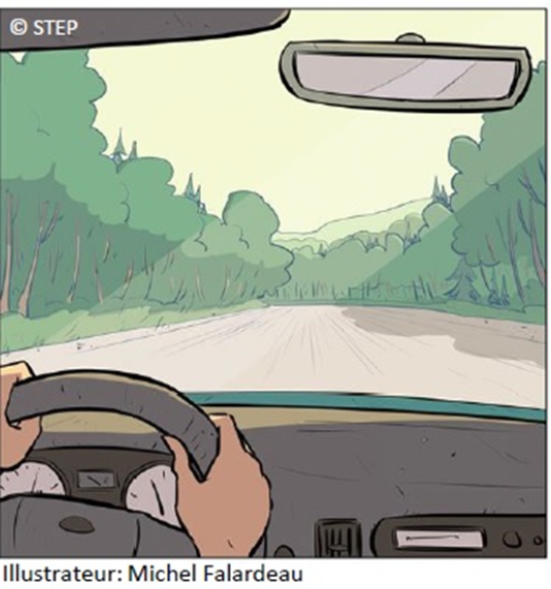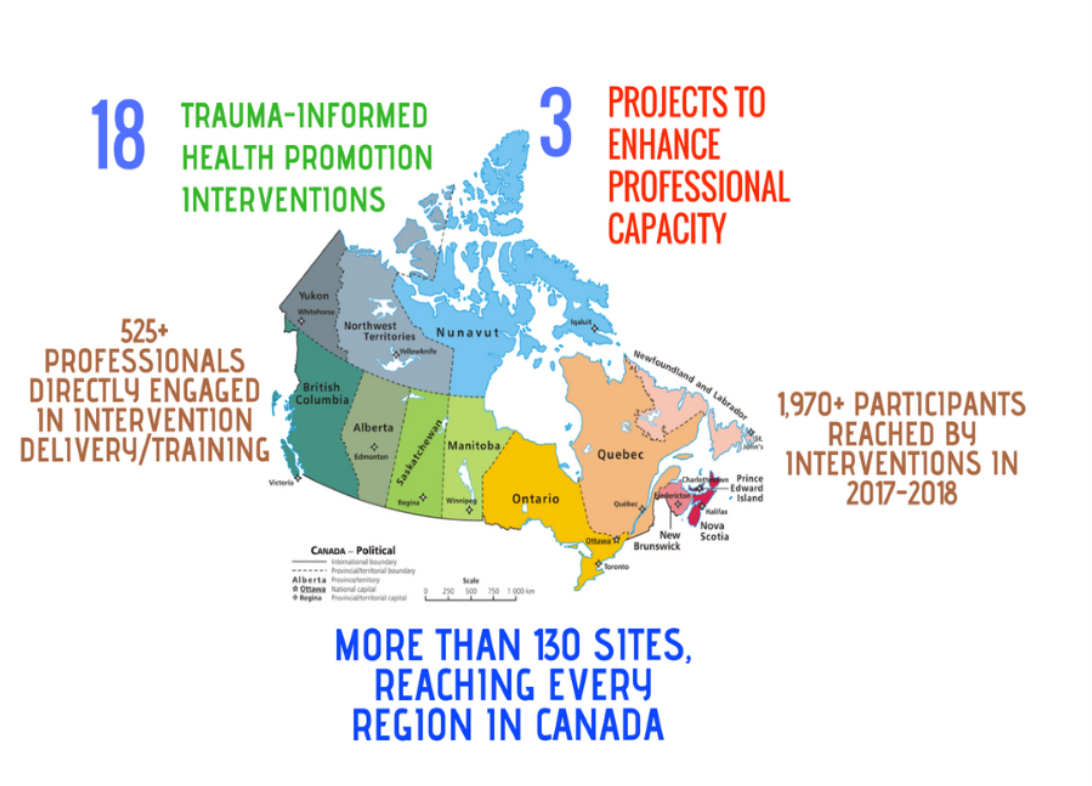Bulletin 9
June 2018
May 2018 Knowledge Exchange
The Hub facilitated a Knowledge Exchange for the Trauma- and Violence-Informed Health Promotion Community of Practice, May 22-23, 2018 in Toronto, Ontario.
Discussions focused on project-related successes and challenges, contextual factors impacting projects and knowledge translation.
Stay tuned for the forthcoming Knowledge Exchange summary report, which will be posted on Basecamp.
Trauma, Resilience and Knowledge Mobilization in Indigenous Contexts
Sandrina de Finney, Associate Professor from the University of Victoria facilitated two workshops: “Re-imagining Trauma, Resilience and Healing in Indigenous Contexts” and “Promising Pathways for Indigenous Research Ethics and Knowledge Mobilization”.
Dr. de Finney demonstrated through an activity, the compounded impacts of trauma on Indigenous peoples resulting from policies such as the Indian Act, the appropriation of Indigenous lands, and the disproportionate number of Indigenous children removed from their families through the child welfare, justice and education systems.
This activity signified that although Indigenous families represent a flourishing industry for services and interventions focused on promoting resilience and healing them, their trauma is too often produced by these very systems. Dr. de Finney emphasized that resilience-building interventions should not involve the systems that create and perpetuate trauma.
In honour of Canada’s National Aboriginal History Month, Andrea Lapp, Anishinaabe from Aamjiwnaang First Nation and Research Coordinator of the MindUP Project, wrote a blog post for Neighbours, Friends and Families, where she shared the story of her grandmother’s cousin and close friend, Geraldine Robertson, a residential school survivor. Her story highlights the incredible resilience and strength of Indigenous peoples.
Knowledge Translation

The STEP project has developed sketches for use during the intervention sessions to deliver messages to participants in an engaging way.
“This image is used during the first session of the accompaniment program STEP to discuss the uneven attention that will be directed during the sessions toward the current experience of participants (the windshield) and their experiences of childhood abuse and neglect (the rearview mirror). The image reminds us that it is highly useful to keep an eye on the rearview mirror to avoid “accidents” but also reminds us that the focus should not mainly be on the rearview mirror (i.e. traumatic experiences from the past), which would be even more hazardous.”
– Nicolas Berthelot, Co-investigator, STEP
Trauma-and Violence-Informed Health Promotion Peer Support programs
Peer support refers to a helping relationship that is based on shared lived experience and includes mutual support, sharing experiential knowledge and skills, and social learning1. Participants and peer mentors may both benefit from a peer mentorship program delivery model, adhering to the trauma– and violence– informed principles of a) understanding trauma, violence and its impacts on people’s lives and behaviors; b) creating emotionally and physically safe environments for all clients and providers;fostering opportunities for choice, collaboration and connection; and, using a strength-based and capacity building approach2.
The Public Health Agency of Canada’s “Supporting the Health of Victims of Domestic Violence through Community Programs” investment has funded trauma- and violence-informed health promotion projects that use peer consultations and/ or peer facilitators/mentors. The Female Genital Mutilation/ Cutting (FGM/C), TransFormed and the Peer Education and Connection through Empowerment (P.E.A.C.E) projects have identified the following benefits to using a peer mentorship model aligned with the trauma-and violence-informed principles.
A. Enhancing understanding of trauma, violence and their impact on people’s lives and behaviours
People with lived experience of trauma/violence/abuse understand the impact of these experiences. The FGM/C project led by Women’s Health in Women’s Hands is using peer mentors who have had similar experiences or are themselves survivors of FGM/C and are already deeply knowledgeable of the impacts and realities of the practice. They not only have an understanding of the issue but have also established strong community relationships, cultural knowledge, and resilience strategies that could help survivors in their healing journeys.
The TransFormed project led by METRAC has a peer leadership group comprised of people with knowledge and understanding of the unique challenges that affect Trans, Two Spirit, Gender Non-conforming and Non-Binary people. Members of the TransFormed peer leadership group vet potentially triggering content and provide helpful and insightful recommendations.
“The Peer-led model has been instrumental in ensuring that contextual factors such as age, race, sexual orientation, disability, class and sex, in addition to gender identity, are also considered when framing the research questions, project materials and health promotion tools.”
– TransFormed Project Team Member
B. Creating safe spaces
One of the goals of trauma-informed care is to cultivate a sense of safety for survivors of violence and trauma. Other principles that are integral to engaging in trauma-informed care are respect, listening, and empathy. It is hoped that peer mentors will cultivate a deeper sense of safety, understanding and empathy among survivors.
“Traditional methods of mentoring often lack a critical lens of the cultural nuances, and realties young African, Caribbean, and Black (ACB) women living in Canada navigate. Within our newly founded netWORKING mentorship program, the peer model has enabled our centre to foster safer spaces and culturally relevant programming for young women who share collective experiences informed by unique intersections of race, age, gender, culture, religion, and class.”
– FGM/C Project Team Member“One can share their experiences without the fear of rejection and isolation that results when others do not have the liberty to speak about their own experiences, do not have lived experience, or are afraid of (or don't understand) non- traditional life events. Past negative voices begin to become less relevant, when participants use and hear their own voices while encouraged by peers. Simultaneously, one realizes their voice matters, is unique, and still accepted and part of the collective. “
– Peer Mentor, P.E.A.C.E Project.
C. Fostering opportunities for choice, collaboration and connection
Participants are more likely to connect to those with similar lived experience. The P.E.A.C.E project led by Covenant House Toronto is engaging healthy and motivated survivors of domestic violence/ intimate partner violence (DV/IPV) and related sexual exploitation as mentors and facilitators. Kasia Ignatowska, Health Promotion Coordinator, explains that the lived experience in combination with gender and proximity in age addresses social isolation for participants. The project has found that there is often a transition from peer support/mentor to friend at the end of the program.
“I naturally felt well connected to the group mentors as a result of the similar age group and shared experiences.”
– P.E.A.C.E. project past participant
D. Using a strength-based and capacity building approach
Peer mentors have benefited from participation in the programs in the following ways:
Peer mentors:
- self-empower by bringing forward their ideas and suggestions for group activities.
- develop leadership skills, public speaking, team work skills and ability to navigate group dynamics.
- network, share advice, and form relationships with fellow survivors to stand together in advocating for ending violence against their bodies and others in their communities.
- have the potential of affecting public policy.
- learn useful knowledge about programs and supports in the community.
- gain financial compensation for their time.
- receive ongoing training and support.
Training provided to peer mentors include:
- self-care, and trauma-informed mindfulness.
- how to handle disclosure from fellow survivors during group sessions.
- facilitation skills to carry out this work in a sensitive, knowledgeable and trauma-informed manner.
“First off thank you for all your kind words because it pays off, I got the job, you are amazing! Sorry, I didn’t make it last night, was super tired. Hope to see you next week! Bless you always.”
– A peer mentor who used P.E.A.C.E Health Promotion Coordinator as a reference for a job.
Peer mentorship appears to be a promising method of adhering to the principles of trauma and violence- informed practice when delivering programs for survivors of violence and trauma.
Member Profile

“I am Wangari Tharao, Director of Research and Programs at Women’s Health in Women’s Hands. The Female Genital Mutilation/ Cutting (FGM/C )is one of the many programs I manage. I am also a recognized HIV advocate and have co-founded several local, provincial, national and international networks to support Black populations living in Canada and other developed countries mount effective responses to HIV/AIDS.
Although my work has focused primarily on HIV in recent years, our newly funded FGM/C project has provided me with an opportunity to revisit my old love – FGM work.
Finally, I am a wife, a mother to one daughter, a sister to many and a loving daughter to my parents. I give thanks to the universe for its sustaining power and guidance. One love!”
Investment Update
During the May 2018 Knowledge Exchange, Shannon Hurley and Sydney Miller from the Public Health Agency of Canada shared highlights from the recent annual reports completed by projects.
This infographic offers numerical highlights from project reports:

Peer Support Resources
Coyne-Foresi, Melissa, "A Mixed Methods Exploration of Benefits for Youth Mentors in an Indigenous High School Peer Mentoring Program" (2017). Electronic Thesis and Dissertation Repository. 4710.
This mixed method case study examined the benefits of serving as a youth mentor to younger peers as part of the Fourth R: Uniting Our Nations Peer Mentoring Program. Mentors identified many personal gains as a result of their participation in the program, as well as improved connection to school.
Ontario Centre of Excellence for Child and Youth Mental Health (2016, June). Youth peer support in a mental health. Evidence In-Sight.
This report provides a review of the literature on youth peer support programs as an emerging practice. It discusses the benefits of peer support, promising practices when integrating youth peer support workers into programs, and offers examples and resources.
SAMHSA’s National Center for Trauma-Informed Care (NCTIC) hosted a series of three 75-minute webinars that introduced key concepts in Trauma-Informed Peer Support:
- Trauma & its impact/Cultural Consideration
- Peer Support basics/Trauma-informed practices
- Applying Trauma-Informed Practices to Peer Support
The Feminist EAAA Sexual Assault Resistance Program for Young Women in University: How it works and what it does and does not accomplish
Date & Time: September 11, 2018 | 1:00-2:15 PM EST
Presented by: Dr. Charlene Senn, Professor of Psychology and Women’s & Gender Studies, University of Windsor
Presentation: The Enhanced Assess, Acknowledge, Act (EAAA) sexual assault resistance education program (aka Flip the Script) is a 12-hour small group, empirically based intervention designed specifically for 1st year women students (17 to 24 yrs old). In this webinar, Dr. Senn will describe the EAAA program and discuss the findings of a Randomized Control Trial (RCT) research study.
Yamikani Msosa’s, “Roots & Resistance” webinar recording is now available!
Roots and Resistance is a webinar that explored in depth conversations about the connections between sexual violence, state violence, and healing from collective and individual sexual abuse and trauma for Black survivors.>
Knowledge Hub Team
Linda Baker, Dianne Lalonde, Sara Mohamed, Anna-Lee Straatman, Jassamine Tabibi
We would love to hear from you! Contact us: smoha84@uwo.ca
Follow us out on Social Media
Facebook: facebook.com/TheLearningNetwork
Twitter: twitter.com/learntoendabuse
